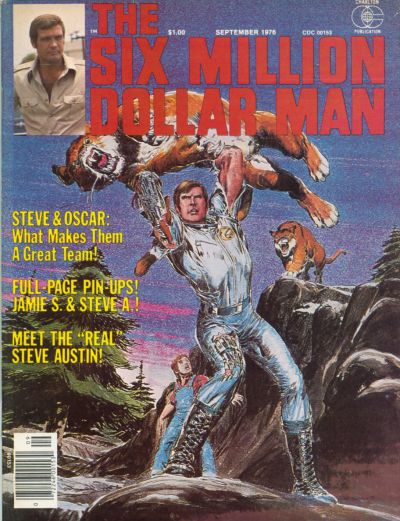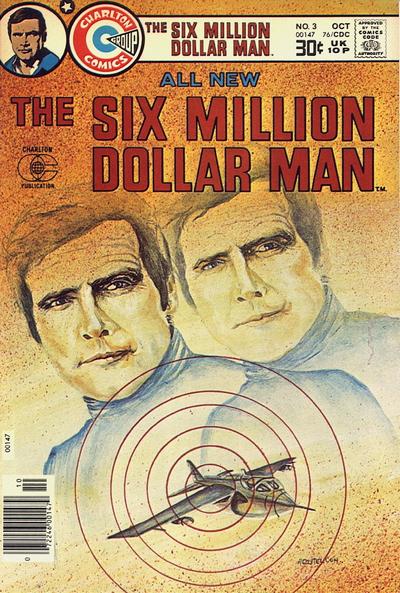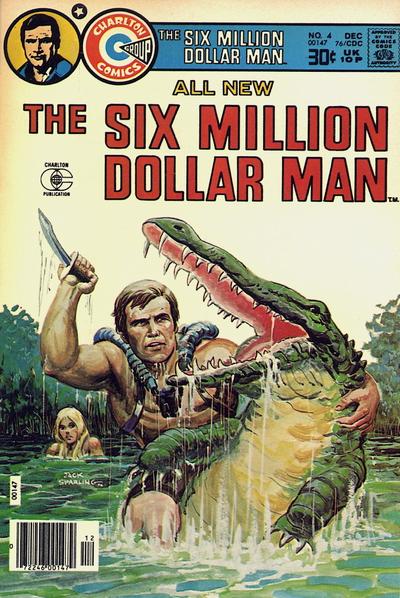I can tell you one thing -- I hate the theme music to The Bionic Woman. It's willowy and soft and noxious in the extreme. But it does point to how the producers want this bionic TV show to come across, and that is friendly and kind, while still stopping villainy. They succeed in that, but I just wish the music was better. Watching this show through 21st Century eyes, the sexism is stunning. Jaime Sommers is smooched and fondled by just about every guy who turns up on the show. Some are cast as family members, but still and all, let the girl breathe. Lindsey Wagner is the lead and she's excellent.
Season One (1976)
There is clearly an attempt to develop a somewhat different tone in The Bionic Woman. Jaime Sommers has had an incredibly stressful origin story. She was severely, suffered surgeries that replaces her arm, her legs, and one of her ears and then used those bionic enhancements to help Steve Austin, the man she'd been engaged to. The difference was she'd lost her memory, and the return of those memories ignited pain, enough that she died. The she was brought back to life and her memories were almost all gone. For the series she has been rehabilitated and knows the truth of her life. She now chooses to live in her old hometown and teach. She is a classic TV teacher who only ever teaches one set of kids and then only when the plot requires it. She is free to help a man who is running from a killer and later an old mentor who seems to want to overthrow the government itself. The also doesn't want anyone to forget its ties to the successful The Six Million Dollar Man and cameos by Lee Majors as Steve Austin are common and Oscar Goldman played by Richard Anderson is a regular.

Season Two (1976-1977)
If there is a clear distinction between The Six Million Dollar Man and The Bionic Woman, it is that leading emphasis in the latter is Jaime's idealism. She's a person looking to do good, whether in the classroom or in the field fighting baddies. The crossover with other show is a big deal in the beginning of the second season. She has the freedom to cry and not lose her hero credibility, in fact it only enhances it. Her tears are not weakness but a sign of empathy. She and Steve have a close friendship if not romance. The season has the ballyhooed crossovers with its older sibling when Bigfoot shows up and the duo must stop a scheme to kill Oscar Goldman. Jaime goes undercover as a wrestler, a card dealer, a cop, and as a country singer to stop various thugs and spies, and as a nun to capture some diamond smugglers who dabble in heroin. She pretends to be a teacher to help protect a young prince. There's a terrific episode when she pretends to be one among a very eccentric band of family members who are battling for the family inheritance. Vincent Price is top notch in this one.

Then she must overcome a small army of what I've dubbed the "Parka People" because they have to wear heavy coats because they've been taken over by an alien force which needs warmth. It's a bit of Invasion of the Body Snatchers meets The Andromeda Strain. (They actually use some footage from the latter I think.) One weird one was titled "Biofeedback" and dealt with a guy who could use that technique to imitate many of the old tricks of the fakirs of days gone by. The end of the world when a pleasant scientist builds a doomsday device. The exchanges between Jaime and the computer named Alex-7000 are clearly meant to evoke Hal-2000. There's a story in which a Jaime must help a young violent girl deal with her horrifying history. A light tale about art forgery and a downright comedic effort about a hard-luck thief who chooses the wrong house to burgle. We get a bit of Oscar history when we learn his brother disappeared during the Pearl Harbor attack under mysterious circumstances. And Jeff Corey shows up as a mentor to Jaime in a story about Native American demons and radiation. Lindsey Wagner must be taking a hand in her wardrobe as well, since some of her frocks are decidedly unusual and there's an awful tendency to wear hats which were regrettably in vogue at the time. But she's not done yet.

Season Three (1977-1978)
The show moves from ABC to NBC in its third and final season. Sadly, it seems to lose some of the sweetness which characterized the previous shows and gets a more generic TV adventure feel. It's notable that Ken Johnson, the creator of the series was absent from many of these new shows. We meet a bionic dog named Maximillion in a two-parter to kick off the third and final season. One gets the sense this was intended as a possible spin-off with the dog hooking up with a Forest Ranger. Then our heroine has to face down the Fembots again, this time in Las Vegas in a wild fracas. While both Oscar and Rudy maintain strong presences on the show, Steve Austin has been largely pushed into the faceless background. Truth told, his place has been taken by Max the dog, who gets another full episode later in the season. Probably the fact the two shows were now on different networks made things difficult to say the least.

Jamie ends up getting missions which take her to the rodeo to protect an eccentric scientist, the depths of Africa to stop a dictator, and... One weirdness is the guest-starring of Evel Knievel in an episode in which comes across as neither comedy nor drama, just odd, as the daredevil is conscripted to help Jaime cross over into East Germany the typically obscure but essential reasons. Then's there's a lift of a plot from the first season when Callahan is tricked by her boyfriend into giving up secrets. Jaime goes into some bogus country to rescue some kid who is portrayed poorly by a young actor in only his second TV role. Much better is Franklyn Ajaye as a computer Robin Hood, committing internet crime before the term was invented. Things get dark when Jaime is poisoned, and world peace is on the line. Full blown science fiction breaks out when we get alien returning in a nod toward those Chariots of the Gods books, Jaime must protect an alien girl, and a "UFO" turns up in an episode as well. The show all but forgets Jaime's life as a teacher and that actually plays into what became the final episode, written with the knowledge the show was ending. It's a remarkable effort with some real conflicts that frankly I wish we'd seen more of during the run.

The Bionic Woman was a better show than I remembered. It was a nifty lens into the 70's, my heyday when we still used phone booths and computers still filled rooms. We lived as we ever have under the abstract fear of nuclear destruction, but detente had allowed those fears to abate. The late 70's was a time of economic hardship for many given the price of oil among other things, but it was also a time of hope. Jimmy Carter was President, and he was a decent man trying his best to do a decent job in extremely hard times. After Watergate, the country was seeing some changes which made politics less hostile and government more trustworthy. Women actually were planning to see life the other side of the Equal Rights Amendment which was nearing success after decades of a creeping crawl. (Sadly, it didn't happen.) In many ways Jamie Sommers was a hero for the time.
Tomorrow, we check out Season Four.
Rip Off























.jpg)





























